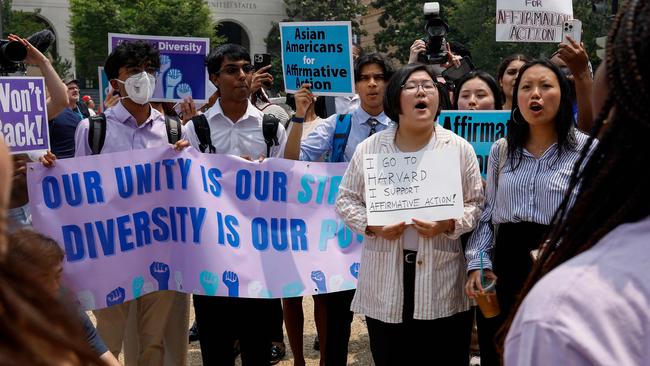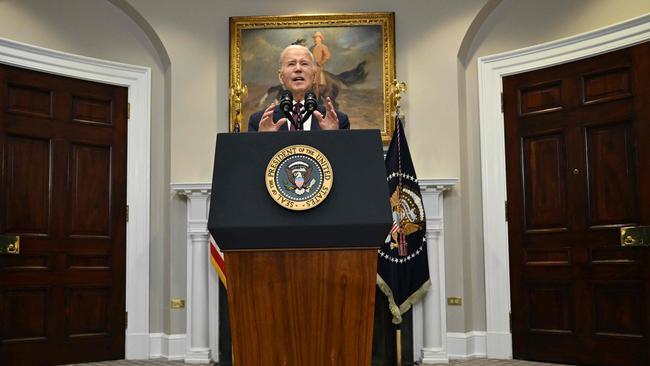US Supreme Court outlaws affirmative action at universities
Joe Biden slams Supreme Court ruling that outlaws affirmative action programs that use race to choose among applicants.

President Joe Biden has slammed a US Supreme Court decision to outlaw university affirmative action programs that use race to select applicants, a landmark court decision that overturns decades of precedent and threatens race-based selection practices throughout the US.
In a pair of decisions that have infuriated Democrats the highest US court on Thursday (Friday AEST) ruled against Harvard University and University of North Carolina, which had sought to defend their use of race as a ‘plus factor’ to determine admissions, a widespread practice at US universities.
The 6 to 3 and 6 2 decisions found that affirmative action contravened the 14th amendment of the US constitution, which provides equal treatment under the law, overturning 45 years of precedent that had permitted universities to use race to foster ‘diversity’.
President Biden, speaking at the White House soon after the decision emerged, said he “strongly disagreed” with the court, accusing it of “rolling back decades of precedent and momentous progress”.
“I believe our colleges are stronger when they are racially diverse … We cannot let this decision be the last word. The court can render a decision but it can’t change what America stands for,” he added, describing the ruling as a “severe disappointment”.
“This is not a normal court,” the president said, after a question by a reporter asking if the Supreme Court had become “rogue”.

Edward Blum, whose conservative group Student for Fair Admissions brought the cases, declared victory on Wednesday (Thursday AEST), declaring the verdict the “beginning of the restoration of the colourblind legal covenant that binds together our multiracial, multiethnic nation”.
“Ending racial preferences in college admissions is an outcome that the vast majority of all races and ethnicities will celebrate. A university doesn‘t have real diversity when it simply assembles students who look different but come from similar backgrounds and act, talk, and think alike,” he added.
Republicans celebrated what had been a widely anticipated verdict owing to the court’s increasingly conservative make up following a number of appointments to the bench by former president Donald Trump.
“This is a great day for America,” said Mr Trump, the frontrunner for the Republicans’ 2024 presidential nomination, who often trumpets his role in making the court more conservative.
“People with extraordinary ability and everything else necessary for success, including future greatness for our Country, are finally being rewarded,” he said in a statement.
Universities in the US have used race as a factor in admissions at least since 1978, when the Supreme Court in the case of California v Bakke ruled pursuit of racial diversity among student applicants via affirmative action programs was justifiable provided admissions weren’t determined exclusively by race.
“Eliminating racial discrimination means eliminating all of it,” Chief Justice John Roberts wrote for the court, joined by Justices Clarence Thomas, Samuel Alito, Neil Gorsuch, Brett Kavanaugh and Amy Coney Barrett. “The student must be treated based on his or her experiences as an individual — not on the basis of race. Many universities have for too long done just the opposite,” he wrote.
The court said the universities’ policies unfairly discriminated against Asian Americans students, who tend to perform well academically relative to other racial groups, while ignoring the past discrimination faced by Jewish, Polish and Irish immigrants who had faced systematic discrimination.
“This is a historic victory for Asian Americans, because our children will no longer be treated as second-class citizens in college admissions,” said Yukong Mike Zhao, president of the Asian American Coalition for Education, in a statement.
In their lengthy judgment the majority stressed that “nothing in this opinion should be construed as prohibiting universities from considering an applicant’s discussion of how race affected his or her life, be it through discrimination, inspiration, or otherwise”.
Affirmative action programs have proliferated throughout the public and private sectors since the 1960s, when new civil rights legislation emerged to stamp out generations of systematic racism against black Americans.
The court’s latest ruling marks a second controversial decision by the powerful court after it last year overturned Roe v Wade, an earlier 1973 Supreme Court decision that had created a right to an abortion, returning discretion over abortion laws to individual states.
“Extremists on the Supreme Court are once again more interested in jamming their right-wing ideology down the throats of the American people,” said Democrat House Minority Leader Hakeem Jeffries, reflecting widespread condemnation by leading Democrat politicians.
The three dissenting justices, appointed by Democrat presidents, said the majority had “ignored the dangerous consequences of an America where its leadership does not reflect the diversity of the People.”’
Society “is not, and has never been, colourblind,” Justice Sonia Sotomayor wrote, joined by Justices Elena Kagan and Ketanji Brown Jackson.
In a departure from standard practice two of the justices, Sotomayor and Clarence Thomas, orally summarised their views from the bench, suggesting strongly held opinions on both sides.
“The Court cements a superficial rule of colorblindness as a constitutional principle in an endemically segregated society where race has always mattered and continues to matter,” she said.
Justice Thomas, a conservative and one of two black judges on court, specifically criticised the court’s latest member and fellow black justice Ketanji Brown Jackson, appointed by Joe Biden last year, in his opinion, arguing her dissenting opinion “locks blacks into a seemingly perpetual inferior caste”.
“Such a view is irrational; it is an insult to individual achievement and cancerous to young minds seeking to push through barriers, rather than consign themselves to permanent victimhood,” he wrote.
The court’s decision comes amid years of polarising debate about race and racial discrimination in American society, one supercharged by the murder of George Floyd, a black man, in May 2020 by a white policeman, which triggered nationwide riots and fuelled policy movements built around perceived racial injustice.
The Court, which traditionally releases verdicts in the last few weeks of June, is expected in the next few days to issue decisions on the constitutionality of the Biden administration’s student loan forgiveness policy, and the relative merit of free speech and gay rights in a case of a Colorado graphic designer who has refused to design websites for gay weddings.




To join the conversation, please log in. Don't have an account? Register
Join the conversation, you are commenting as Logout